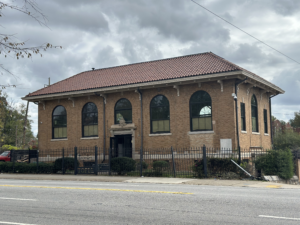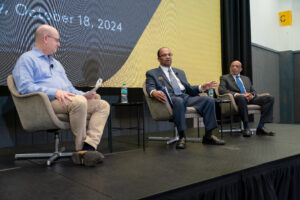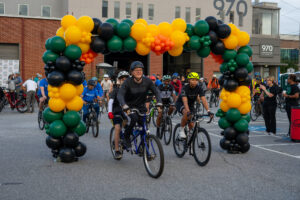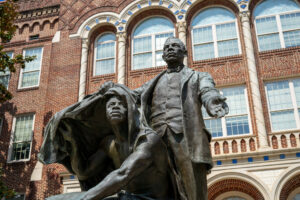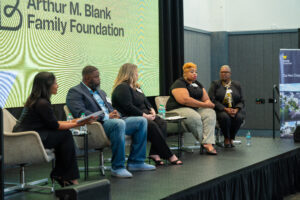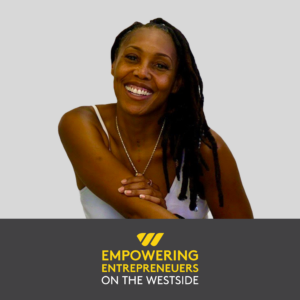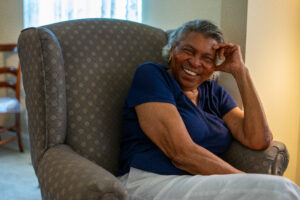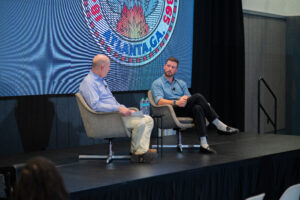In 2019, Food Well Alliance and Westside Future Fund partnered to purchase and revitalize 970 Jefferson St. NW, the historic site of the Atlanta Community Food Bank. Bill Bolling and John Ahmann played pivotal roles in making this acquisition a reality, turning a shared vision into a success. The two organizations collaborate on managing the facility, with Food Well Alliance overseeing the warehouse and upstairs space, while Westside Future Fund is responsible for maintaining the rest of the building.
Today, 19 nonprofits and local enterprises utilize 970 Jefferson, operating from this revitalized space to collectively contribute to the betterment of the Westside community and beyond, embodying the shared vision that inspired the partnership. We’ve launched a new series, the 970 Partner Spotlight, to highlight each of these incredible organizations and their work. One of these integral partners is Food Well Alliance, a nonprofit focused on empowering local growers and building healthy food systems.
A Mission Rooted in Local Food and Community
Healthy food is the foundation of healthy communities, and Food Well Alliance understands this deeply. The organization is dedicated to empowering growers at urban farms, community gardens and orchards across metro Atlanta by providing essential resources and support to help them thrive, according to Kate Conner, the organization’s executive director.
“We’re all about getting as much locally grown food out to communities as possible,” said Conner.
This mission is realized through their support of over 300 growing spaces since 2015, including local farms, community gardens, and orchards.
“We serve five counties—Fulton, Cobb, Gwinnett, DeKalb, and Clayton—and we provide everything from compost delivery to small grants,” said Conner.
Food Well Alliance’s efforts are also deeply hands-on, offering labor support to help build greenhouses, repair garden beds, and more. Last year alone, they provided nearly $900,000 in direct support to growing spaces, contributing to their mission of connecting communities through food.
A Growing Impact
Since its founding in 2015, Food Well Alliance has invested over $7 million in the local food movement. This support has resulted in the planting of over 90 orchards and countless gardens across Metro Atlanta. One of the most exciting projects on the horizon is their Orchard Project, which aims to plant 15 orchards per year. This initiative, in partnership with organizations like The Giving Grove and the Atlanta Regional Commission, ensures that fresh, locally grown fruit will be available for generations to come.
Conner shared that West Atlanta, particularly the Westside, is a significant focus for the organization.
“West Atlanta has one of the highest densities of community gardens and urban farms,” said Conner.
This area has become an anchor for the urban farming movement in the city, with a rich history of communities making the most of available space to grow food and foster connection.
Collaboration at 970 Jefferson
Food Well Alliance’s partnership within the 970 Jefferson building has been pivotal. Located in a space formerly occupied by the Atlanta Community Food Bank, the building has a long history of serving the community.
“When we launched 970, the commitment was to bring together organizations that were doing important work in the community, and that’s exactly what we’ve done,” said Conner.
Being part of a shared hub of like-minded nonprofits has allowed for invaluable collaboration.
“We share everything from tools and equipment to ideas and resources,” said Conner.
The organization often collaborates with partners like Urban Recipe, another nonprofit based at 970 Jefferson, to ensure fresh produce reaches families in need. The proximity of organizations working toward common goals has made the space a hub of innovation and impact in the community.
For Food Well Alliance, being part of 970 Jefferson is more than just sharing a workspace—it’s about fostering connections that amplify each organization’s ability to serve.
“It’s the natural overlaps and conversations, sometimes while making a cup of coffee, that lead to greater efficiencies and strategic collaborations,” said Conner.
Looking Ahead
Food Well Alliance has some exciting projects on the horizon, with Conner highlighting the importance of continuing to grow the Orchard Project and expand their City Agriculture Planning Program, which helps cities develop comprehensive plans for urban agriculture. This program connects metro Atlanta municipalities with growers, residents, and leaders in their communities. Each year a new city is selected to partner with Food Well and the Atlanta Regional Commission to develop a plan. Food Well provides a $75,000 grant for implementation, ensuring that cities can launch initiatives like community composting and expanded farmers markets. Food Well has developed plans in four cities: East Point, Alpharetta, Jonesboro, and Austell. Applications for the fifth city will be accepted through November 22. The new city partner will be announced in January. Learn more at https://www.foodwellalliance.org/city-agriculture-planning.
As Food Well Alliance continues to plant seeds across Atlanta, their commitment to creating healthy, connected communities remains steadfast. Their work at 970 Jefferson is a powerful example of how collaboration and shared resources can drive meaningful change.
Learn more about how 970 Jefferson is bringing together a collaborative community of service at 970Jefferson.org

